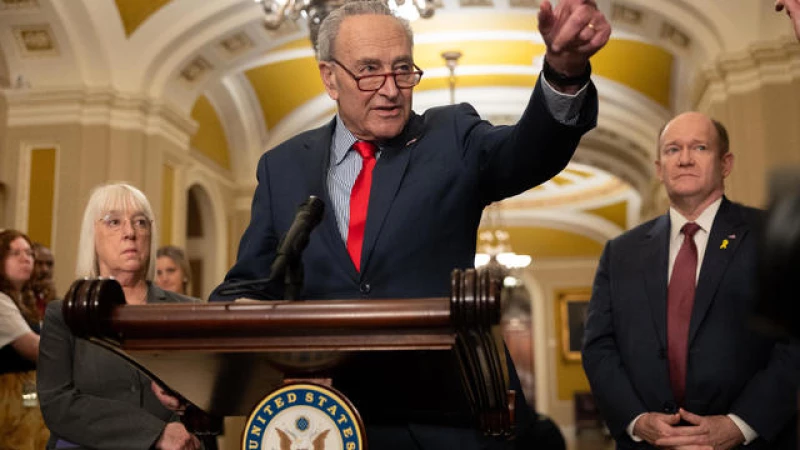Washington — An expedited bill aiming to prohibit TikTok from operating in the U.S. breezed through the House on Wednesday, but is encountering resistance in the more sluggish Senate, where previous attempts to limit the app have faltered.
The House overwhelmingly approved the bill, named the Protecting Americans from Foreign Adversary Controlled Applications Act, with a vote of 352 to 65. The measure would mandate that TikTok's parent company, ByteDance based in Beijing, sell TikTok within six months to continue using U.S. web-hosting services and app stores.
The bipartisan bill gained momentum swiftly in the House, progressing unanimously out of the House Energy and Commerce Committee last week. However, it has also encountered a wave of opposition from American TikTok users, along with criticism from lawmakers who argue it violates the First Amendment.
Policymakers from both sides have consistently highlighted the national security risks posed by TikTok, cautioning that the Chinese government could exploit the short-form video app to conduct surveillance on Americans, propagate misinformation, or foster discord.
"The issue does not lie with TikTok or the videos," declared Sen. Marco Rubio of Florida, the leading Republican on the Senate Intelligence Committee, on Monday during a hearing addressing global threats. "The real concern is that the algorithm fueling it is under the control of a Chinese company that is obligated to comply with directives from the Chinese Communist Party."
Critics of the proposed legislation argue that it may restrict freedom of speech by removing a platform that millions of Americans use to voice themselves and access information, potentially harming businesses and content creators who depend on it for their livelihoods.
The White House is urging the Senate to swiftly advance the bill.
"We expect the Senate to act promptly," stated White House press secretary Karine Jean-Pierre, emphasizing the administration's desire for the bill to have a solid legal foundation.
China entered the discussion on Thursday, as reported by Agence France-Presse. A spokesperson from Beijing's commerce ministry was quoted saying, "The U.S. should genuinely respect the principles of a market economy and fair competition, and cease unjustly suppressing foreign companies."
The spokesperson also warned that China would "take all necessary measures to firmly defend its legitimate rights and interests."
The TikTok bill faces hurdles in the Senate
Despite widespread acknowledgment of the risks associated with TikTok, senators seem to be in no hurry to advance the House TikTok bill to President Biden, who has pledged to approve it.
Senator Kevin Cramer, a Republican from North Dakota, expressed his support for the legislation but indicated that the Senate is unlikely to act swiftly.
Senator Rand Paul, a Republican from Kentucky, criticized the "hysteria" surrounding TikTok and argued that the bill contradicts the First Amendment. His opposition necessitates that the Senate allocate valuable time for deliberation.
Majority Leader Chuck Schumer has not committed to scheduling a vote on the bill. In a brief statement following its passage in the House, the New York Democrat stated that the Senate "will assess the legislation upon its transmittal from the House." Schumer also mentioned that he intends to confer with pertinent committee leaders "to ascertain their perspectives."
Following the House vote, Sen. Mark Warner of Virginia, the Democratic chairman of the Senate Intelligence Committee, announced his support for the bill. Warner, along with Rubio, discussed the issue on "Face the Nation" and expressed optimism about the bipartisan support the bill is receiving.
Sen. Maria Cantwell, a Washington Democrat and chair of the Senate Commerce Committee, holds the key to the bill's fate. The bipartisan RESTRICT Act, which would empower the Commerce Department to regulate technology from U.S. adversaries, has been stagnant in the committee since last year.
Cantwell hinted that the House bill might face a similar fate in the Senate, stating, "I will be talking to my Senate and House colleagues to try to find a path forward that is constitutional and protects civil liberties."
Meanwhile, Sen. Dick Durbin, an Illinois Democrat, expressed concerns about the constitutionality of the bill and has not yet decided on whether TikTok should be banned.
"I believe it's time for a clear separation from China in terms of the ownership and management of this company," stated Durbin, who heads the Senate Judiciary Committee.
Overall, the Senate's response to the House bill has been varied.
Senator John Kennedy, a Republican from Louisiana, expressed the need for a classified briefing on the matter before reaching a decision, mentioning on Wednesday, "I'm not there yet."
Senator Richard Blumenthal, a Democrat from Connecticut, voiced his support for "requiring divestment," deeming it as well-deserved.
"The Chinese are gathering information, conducting surveillance, and utilizing TikTok for their national security interests, and we should oppose it as the House bill suggests," he remarked on Tuesday.
On Monday, Senator John Cornyn mentioned his uncertainty about the proposed solution but acknowledged TikTok as "a significant national security concern." A spokesperson for the Texas Republican stated on Wednesday that some of his concerns were addressed in the version heading to the Senate.
Republican Senator Josh Hawley of Missouri indicated his full support on Tuesday, although he expressed skepticism about the bill receiving a floor vote.
"I am hopeful it will be voted on in the Senate," he commented. "However, as I have consistently predicted, it seems unlikely now that it will."
A representative from TikTok expressed optimism following the House vote, stating that they are hopeful for the Senate to review the facts, listen to their constituents, and understand the potential impact on the economy, 7 million small businesses, and the 170 million Americans who utilize their platform.
During a video released on Wednesday evening, TikTok's CEO Shou Zi Chew announced that the company intends to exercise their legal rights and urged users to reach out to their senators to defend their constitutional rights and ensure their voices are heard.







